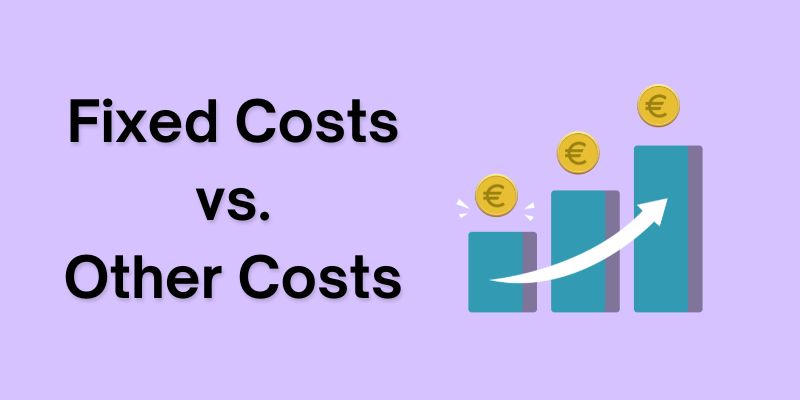Have you ever wondered why some expenses seem to stay the same no matter how much a business fluctuates? Youre not alone in this observation. Theres a term for this type of cost. In business, we call it Fixed Cost. This article will provide a detailed explanation of their definition, importance, and impact. Well tell you how to calculate them and also compare them to other types of costs. Lets get started.
What Exactly Is A Fixed Cost?
Fixed costs are a type of expense for a business that doesnt change (decrease or increase) regardless of the change in production, labor, or the number of sales. They can stay fixed for long periods regardless of changes in the business, or they can be for short-term, such as a lease agreement for rent. In short, fixed costs are indirect costs in the sense that they are not affected by a businesss revenue and expenses. Now, you might be wondering how that is possible. Lets show you some examples:
Examples Of Fixed Costs
Fixed costs come in many forms but generally fall into a few categories.
- Phone service is a fixed cost because its not affected by the businesss sales.
- Rent is a type of fixed cost. It doesnt go up or down based on whether a business is selling more or less.
- Utilities like electricity and internet might have minor variations, but they can also be considered fixed costs in most cases.
- Insurance premiums, like property insurance or business liability insurance, are typically fixed costs as well.
- Another example is property tax. A business pays this tax based on the amount of real estate it owns, unaffected by the goods it sells.
Why are Fixed Costs Important?
Fixed costs are like the foundation of your business budget. They help you predict your finances and set realistic goals. Since you know exactly how much these costs will be, you can plan your income (sales) needed to cover them and make a profit. This is called your break-even point, the sales level where your business isnt losing or making money. By keeping your fixed costs in check, you can lower your break-even point, making it easier to turn a profit.
Additionally, analyzing fixed costs helps you identify areas for savings. Maybe you can negotiate a better rent deal or find a more cost-effective way to handle certain tasks. This can all add up to a healthier bottom line (your profit). So, while fixed costs might not change day-to-day, they still play a significant role in the businesss overall success.
How to Calculate Fixed Costs

Figuring out your fixed costs is a straightforward process. Heres how to do it:
- Gather your financial statements: Look for your income statement or any document that lists your business expenses.
- Identify fixed costs: Review each expense and ask yourself if it changes with your production volume. Rent, salaries, and insurancethese are all fixed costs because they stay the same regardless of how much you produce or sell.
- Total them up: Once youve identified all your fixed costs, simply add them together to get your total fixed cost amount.
Knowing your total fixed cost is crucial for budgeting and planning. It helps you set realistic sales targets to cover those costs and make a profit.
Impact of Fixed Costs on Business Decisions
Fixed costs play a significant role in crucial decisions you make for your business. Heres how:
- Pricing: Since you need to cover your fixed costs to stay afloat, they influence how you price your products or services. Youll need to factor them in when setting prices that are competitive but also generate enough income.
- Production Volume: Balancing production volume with fixed costs is key. If you produce too little, you might not make enough sales to cover your fixed costs and end up losing money. On the other hand, producing too much can lead to wasted inventory and unnecessary expenses.
- Economies of Scale: This concept relates to how your fixed costs become less impactful as your business grows. Think about spreading your rent cost over a larger number of products sold (e.g., $1,000 rent over 1,000 products vs. 10,000 products). The fixed cost per unit goes down, making your business more efficient.
- Managing Fixed Costs: There are ways to manage fixed costs depending on your situation. Negotiating better rates with suppliers, reviewing phone and internet subscriptions to eliminate expensive and unnecessary ones, and exploring alternative workspace options can all help you keep your fixed costs under control.
Fixed Costs vs. Other Costs

Fixed Costs vs. Sunk Costs
- Sunk Costs: Unlike fixed costs, sunk costs are expenses youve already paid and cant get back. They dont change with your current business activities.
- The Difference: For example, rent is a fixed cost because you pay it regularly. But money spent on a marketing campaign that didnt work is a sunk costits gone and cant be recovered.
- Irrelevant for Decisions: Since sunk costs are already spent, they shouldnt influence future business choices. Focusing on current fixed costs and future variable costs (expenses that change with production) will help businesses make sound decisions.
Fixed Costs vs. Variable Costs
- Fixed Costs: Stay the same regardless of production volume (e.g., rent, salaries).
- Variable Costs: Fluctuate based on how much you produce or sell (e.g., raw materials, labor for production).
Think of it this way: If youre a chef, then fixed costs are like the rent you pay for your kitchen, while variable costs are like the groceries you buy to cookthey depend on how much youre cooking.
Are Fixed Costs Really Fixed?
While called fixed, these costs arent set in stone forever. Heres why:
- Renewal Negotiations: Leases, contracts, and even salaries can change when renewal time comes. Businesses must be prepared to negotiate for better rates or adjust their budgets accordingly.
- Business Growth: As a business grows, it might need a bigger workspace or hire additional staff, which can impact its fixed costs.
- Unexpected Events: Market shifts or unforeseen circumstances can cause fixed costs to fluctuate. Planning for these unpredictable events in a budget is important to handle these situations.
Conclusion
Fixed costs are an essential part of your business budget. Understanding them helps you set realistic goals, make intelligent pricing decisions, plan for growth, and analyze the businesss overall financial health. By keeping a close eye on these costs and employing effective management strategies, you can ensure your business has a solid foundation for long-term success.




